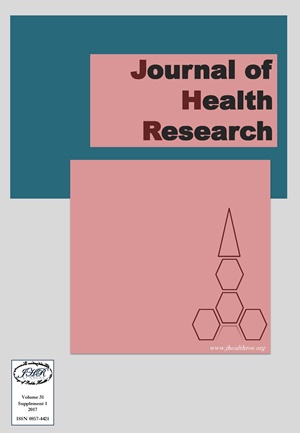Healthcare Providers’ Knowledge and Perception in the Provision of Palliative Care in Patients with Non-Cancer Life-Limiting Chronic Disease in the Private Hospital in Bangkok, Thailand
Keywords:
Palliative care (PC), Palliative care knowledge, Perception of palliative care, Provision of palliative care, Healthcare providers (HCP)Abstract
Background: Although palliative care provides benefits to healthcare system, good management practice of palliative care is not broadly analyzed to all kinds of illnesses. Patients with chronic illness have impaired quality of life and emotional well-being but have less obtainment of palliative care. Healthcare providers are expected to have more knowledge related to palliative care, good perception and provision of care to maintain patients’ quality of life. This study aimed to describe the level and identify the most influential factors of healthcare providers to knowledge, perception and provision of palliative care.
Method: This study was a cross-sectional descriptive quantitative research based on surveying to identify knowledge, perception and provision of palliative care by Thai healthcare providers in private hospital to non-cancer, life-limiting and chronic illness patients. In order to obtain all the formation, 227 health provides were participated in the data collection process.
Result: The average of sum scores of the participants was 19 meant they had good knowledge (x̅ = 18.97, S.D. =2.11). However, most participants incorrectly answered on palliative care in patients with heart disease (n=111, 49.1%). The most influential factors of healthcare providers to the level of palliative care knowledge significantly were age (p= 0.04) and position of work (p =0.001) (p < 0.05). In their perception, the aspects that had the most effect to palliative care were “ethic and legal issues” (x̅ = 4.18, S.D. = 0.648) and “organization and policy” (x̅ = 4.17, S.D. = 0.584). For the provision of palliative care, the behavior that healthcare providers mainly performed is providing care gently (x̅ =4.48, S.D. = 0.693) but less performed in providing conversation about the aims of life and the life after death with patient (x̅ =2.80, S.D. =1.350). For the most influential factors of healthcare providers’ demography to the level of provision of palliative care significantly were position of work (p = 0.029) and palliative care education (p =0.002) (p < 0.05).
Conclusion: Palliative care knowledge, cooperation of multidisciplinary care team and training palliative care skill are important for healthcare providers to cope with the patients and families. It is to explore the needs and also policy planning to provide good quality of palliative care.







